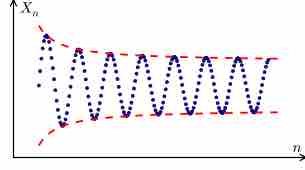A series is the sum of the terms of a sequence. Finite sequences and series have defined first and last terms, whereas infinite sequences and series continue indefinitely. Unlike finite summations, infinite series need tools from mathematical analysis, and specifically the notion of limits, to be fully understood and manipulated. In addition to their ubiquity in mathematics, infinite series are also widely used in other quantitative disciplines such as physics, computer science, and finance.
For any infinite sequence of real or complex numbers, the associated series is defined as the ordered formal sum
The sequence of partial sums
Infinite sequences and series can either converge or diverge. A series is said to converge when the sequence of partial sums has a finite limit. By definition the series
If the limit of is infinite or does not exist, the series is said to diverge.

Infinite Series
An infinite sequence of real numbers shown in blue dots. This sequence is neither increasing, nor decreasing, nor convergent, nor Cauchy. It is, however, bounded.
An easy way that an infinite series can converge is if all the